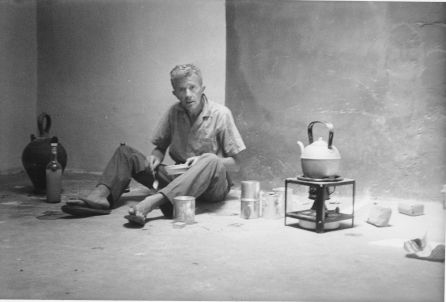[This is the fourth in a series of dispatches relating to the 2011 New York Film Festival. All of Reluctant Habits’s NYFF posts can be located here.]
Narratives which involve affluent English-speaking types venturing into foreign terrain in order to find themseleves are only as good as Paul Bowles’s inevitable yardstick. The Sheltering Sky is, despite my qualms, arguably the definitive novel on the subject. One senses that writer-director Julia Loktev, in naming her film The Loneliest Planet, is aware of this inevitable comparative point. It is worth observing that her cinematographer Inti Briones is fond of pointing the camera down — that is, when he has actual light to work with. Loktev has also given her couple two pairs of green pants — the better to camouflage their spindly legs into the surrounding territory.
Loktev does have the benefit of a Tom Bissell story (“Expensive Trips Nowhere,” contained in God Lives in St. Petersburg) as her source material. But in seeking her own spin, Loktev demonstrates a diffidence when it comes to character motivation. This is somewhat troubling, given the way finances and togetherness (or the lack thereof) are vital parts of Bissell’s story. The film is, however, concerned superficially with the Georgian terrain. And that’s just as it should be for a film trying to mine deep into, well, whatever happens to exist before the camera, which serves as the primary creative motivation here.
Other reviewers — including one from Variety — have called these characters “hipsters.” But I suspect these writers, looking for any noun in the air in their desperate efforts to summarize a lightweight, largely unconsidered, and fairly unrevealing film, haven’t experienced the tangible terrors that I have. Nica (Hani Furstenberg) may be quite thin and Alex (Gael Garcia Bernal) may be bearded (Alex even promises to shave the beard off later: this is not a pledge you get very often in Williamsburg). But these two aren’t any more or less obnoxious than most Americans. Nor are they especially vegan or passive. As someone who has a great deal of hostility for a certain type of extreme layabout, I can report that I did not want to kill Nica or Alex at any point during this movie. On the other hand, I didn’t especially care about what happened to them.
But Dato (Bidzina Gujabidze), the guide who proves to have more than Georgia on his mind, did interest me — even as Loktev was more concerned with capturing her characters as specks traversing vast vistas (complete with the music cues turning on and off with the cuts to these long takes). He seems to put up with more than he should, including having to sing “Meow meow meow” in response to an especially superficial song.
I should probably point out that the film’s early moments (along with many other night scenes involving a flashlight) demonstrate a partial commitment to the hidden and the cluelessly jaunty: a flapping blanket hiding domestic tranquility, the happy couple hanging off a bus’s rail like monkeys, Nica licking Alex’s cheek as they take a snapshot against a mountain. But that’s about as close as the film gets to Bowles’s tourist vs. traveler distinction.* The film isn’t especially interested in explanations, but it is ballsy enough to elide subtitles. Which means that the audience is as much of a tourist as this couple. This serves as a great advantage when three locals show up and point a rifle at Alex’s head, especially since his first impulse is to hide behind Nica (only to try rescinding this gaffe by squeezing in front of Nica and standing before the rifle). You’d think that such a lousy move would cause strife. Or at least some wilderness equivalent to sleeping in the couch. But it’s never mentioned again.
This incident, along with several minor moments that follow (mostly involving this trio trudging through terrain, all as lonely as their backpacks), suggests that this union has trouble in paradise. When Nica offers Dato a kiss on the cheek, shortly after he has confessed that he has not been with a woman in five years, Dato takes swift advantage, his tongue speaking a gestural language associated with that country presently banning street prayer and his finger clambering inside a joyful jackpot. Be careful what you wish for.
Like the man with the gun, this near adulterous episode isn’t brought up again. And I suspect this has something to do with Loktev’s misunderstanding of Bissell’s story. During the press conference (audio of which can be listened to below), it was revealed that an early version of the script was only 45 pages and that Loktov loathed writing. To add insult to injury, none of the assembled trio on stage –- Loktev, Furstenberg, and the somewhat smug Richard Peña -– were especially interested in mentioning Bissell’s name. Furstenburg referred to the film as “Julia’s story.”
I was forced to ask Loktev a question (which you can hear around the 17 minute mark). Notice how Peña undermines the issue by not mentioning Bissell’s name.
Correspondent: There was mention earlier of a 45 minute script. And you mentioned earlier, Julia, that you detest writing. I’m wondering why you didn’t reach out to any other writer — like, say, Tom Bissell? Did you make any efforts to work with him?
Peña: The question is whether or not, since you say you don’t like writing, whether you ever thought about working with a writer, perhaps the author of the short story or someone else.
Loktev: No. I mean, for me, it was a matter of taking what I was interested in from the short story and writing from there. I said a little bit in jest that I don’t like writing in the sense that I don’t aspire to be a novelist. But, for me, the script — actually, I think it was about 30 pages. But, you know, the lines were all in there. The funny thing is that the lines were all in the script more or less. They just weren’t indented. This is the thing that people kind of — I find it very strange. People always say, “You don’t have a script that was the same with Day Night Day Night.” And I’m like, “It’s only because the lines are in the middle of the paragraph. And they’re not indented like they are in the normal scripts.” And when so much of the film takes place in silence, some of those things are very precisely described in what I write. Like I will describe the movement of a hand. And it’s that precisely outlined, you know. I didn’t want more dialogue than that.
In considering this transformation from “Tom Bissell” to “the author of the short story” to “taking what I was interested in,” I was led by chance into a pleasant email volley with Tom Bissell. Bissell assured me that Loktev was very up front about modifying much of the story. He reported that his interactions with Loktev were friendly and professional, very much in the “go ahead and run with it” mode. But the question that’s still nagging at me is whether or not Loktev’s film transforms the material sufficiently enough to warrant the praise. Because what I saw on Monday morning was a fairly ho-hum narrative devoid of the human context that’s there in Bissell’s story. And if I have to play favorites, then I’d rather go with the artist who knows what he’s writing rather than the one who’s about as committed to the human condition as, well, a ditzy hipster who doesn’t have the guts to put herself on the line.
* “[A]nother important difference between tourist and traveler is that the former accepts his own civilization without question; not so the traveler, who compares it with the others, and rejects those elements he finds not to his liking.” — The Sheltering Sky
NYFF 2011: The Loneliest Planet Press Conference (Download MP3)


 When I first discovered the names Kit, Port, and Tunner, my mind instantly concluded that these must be debauched head honchos for some baleful corporate defense firm. This was then followed by a few inescapable jokes that I delivered to walls of books when nobody was around: Tunner getting Kit’s kit off, Port in a storm, and so forth. I am sad to report that the tomes offered no laughs or kind titters in return. Neither, for that matter, did my copy of The Sheltering Sky: a grim and largely humorless volume that did an impressive job filling about six hours of my life with a stupendous sense of dread. (I feel dreadful just remembering the experience of reading this book, even though I simultaneously recognize the book’s virtues and now see just how much Dan Simmons was channeling Bowles with his excellent debut novel, Song of Kali.)
When I first discovered the names Kit, Port, and Tunner, my mind instantly concluded that these must be debauched head honchos for some baleful corporate defense firm. This was then followed by a few inescapable jokes that I delivered to walls of books when nobody was around: Tunner getting Kit’s kit off, Port in a storm, and so forth. I am sad to report that the tomes offered no laughs or kind titters in return. Neither, for that matter, did my copy of The Sheltering Sky: a grim and largely humorless volume that did an impressive job filling about six hours of my life with a stupendous sense of dread. (I feel dreadful just remembering the experience of reading this book, even though I simultaneously recognize the book’s virtues and now see just how much Dan Simmons was channeling Bowles with his excellent debut novel, Song of Kali.)